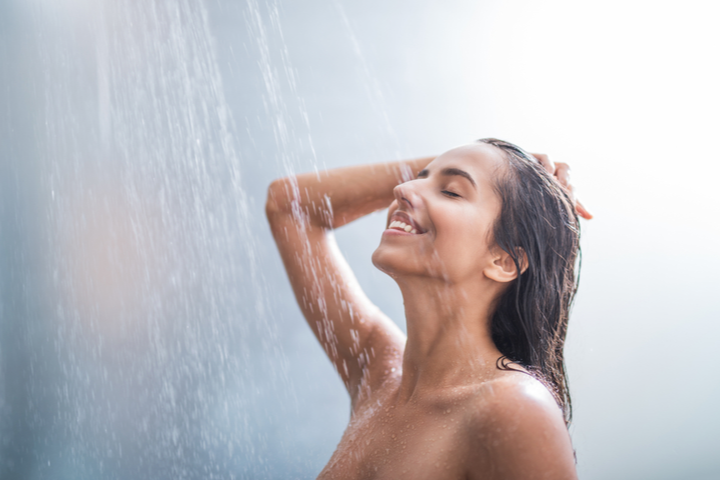What those Long, Hot Showers are Doing to Your Skin

Who doesn't love taking a long hot shower in the winter? The only trouble is, it's not exactly great for your skin. According to the derms, showering in hot water can trigger everything from dry skin to acne and even jeopardize your skin's defence mechanisms. So even though it feels fantastic, you might want to consider turning down the water temperature if you care about your skin's health.
Here's everything you need to know about hot showers and their impact on the skin.
Hot Showers Can Exacerbate Dryness
A hot, steamy shower or bath during the winter months can be detrimental to your skin. While it may feel good in the moment, long hot showers can lead to excessively dry and itchy skin. That's because hot water strips the skin of natural oils, leaving the skin vulnerable to dryness.
"Dry skin is the most common cause of itchy, irritated skin so it is important to avoid overly hot baths and showers," says Dr. Harry Dao, assistant professor of dermatology at Baylor. "I recommend taking lukewarm baths and showers."
Hot Showers Worsen Existing Skin Conditions
Those with skin conditions such as eczema (atopic dermatitis), psoriasis, rosacea may experience worsened symptoms when taking hot showers. That's because hot water strips the skin of its sebum, which is responsible for protecting and hydrating the skin.
Even if you do not have an existing skin condition, prolonged exposure to hot water can initiate the development of one.
"Those with extremely dry skin or who are genetically prone to having sensitive skin can develop eczema, characterized by itchy, dry, pink patches," says board-certified New York City dermatologist Shari Marchbein.
Hot Showers Can Aggravate Acne
If you've got acne or are acne-prone, showering in hot water definitely won't do your skin any favors. Hot water opens pores and stimulates sebum production that leaves skin prone to breakouts.
That doesn't mean showering in cold water or warm water will get rid of your acne, but it does suggest things won't get worse. In fact, for some people, switching to lukewarm showers has actually cleared their acne and acne-like rashes.
Hot Showers Leave Skin Red
Hot showers cause blood vessels to dilate which can leave you with a red, flushed face and broken blood vessels. If you notice your face always looks red after taking a shower, that's a clear indicator your shower water is way too hot.
Those with sensitive skin should be especially careful, since their skin type is particularly vulnerable to irritation and dryness.
Hot Showers Compromise the Skin Barrier
Searing hot temperatures are known for compromising the skin barrier, which affects the overall look, feel, and health of your skin. For that reason, turn your water temperature down the next time you hop in the shower. And keep it down!
"The skin barrier is made up of skin proteins and oils that prevent water from evaporating out of the skin, protecting it from the outside world," explains New York dermatologist Robert Anolik. "It is one of our first lines of defense against infection and pollution."
Since hot water disrupts the normal skin barrier, high water temperatures can be responsible for weakening your skin's line of defence, leaving it vulnerable to inflammation, dryness, and premature aging.
ARE COLD SHOWERS BETTER?
Cold showers and hot showers both have their advantages and disadvantages. While hot showers can be drying and damaging to the skin, they do come with health benefits such as lowering blood pressure, improving circulation, and relieving muscle tension. Cold showers, though less enjoyable, promote clearer, smoother, more nourished skin. They're also said to boost your immune system, increase weight loss, and enhance blood circulation.
Are cold showers really better than hot showers? According to the pros, the best water temperature to shower in is lukewarm water -- not too hot, not too cold. Lukewarm water promotes healthy skin since it's not too harsh and won't dry out the skin.
THE RIGHT WAY TO TAKE A SHOWER
There's not really a right or wrong way to shower. At the end of the day, the whole purpose of showering is to stay clean and fresh. But if you want to maintain your skin's natural moisture and ward off issues like dryness, acne, and itching, you may want to upgrade your shower routine. Here are some tips for a better shower starting today.
- Keep Things Cool
According to dermatologists, you should be washing your face and showering in lukewarm water. This will prevent issues like dry skin and itchiness.
- Make it Quick
Water temperature isn't the only important factor when it comes to skin health. Long showers can be extremely drying to the skin. Even if you are showering in lukewarm water, the prolonged exposure to water can leave skin dehydrated. Make a habit of having short showers.
- Cleanse with Care
Avoid harsh soaps which are known for drying out the skin. Invest in a gentle cleanser and make it part of your daily routine to keep skin healthy and hydrated. Choose sulfate-free formulas made with nourishing, moisture-retaining ingredients such as hyaluronic acid, glycerin, shea butter, and coconut oil.
- Exfoliate Occasionally
To keep thing smooth and glowing, exfoliate your face and body twice a week using a formula made with alpha hydroxy acids like glycolic or lactic acid. We recommend our Glow Bundle or Tighten Bundle.
- Always Finish with Serum or Lotion
As soon as you finish showering and drying off, slather on a hydrating body lotion or serum to inject moisture back into the skin. Try Rainbow's Hydrate Bundle, which contains a face and body mask and serum infused with hyaluronic acid and vitamin B5 to inject ultimate hydration into the skin. For maximum absorption, apply it to slightly damp skin and leave it to fully absorb before getting dressed.
We know how much you love your long, hot showers. However, if you want to keep your skin soft, healthy, and hydrated, now is the time to make this tiny tweak to your shower routine.
